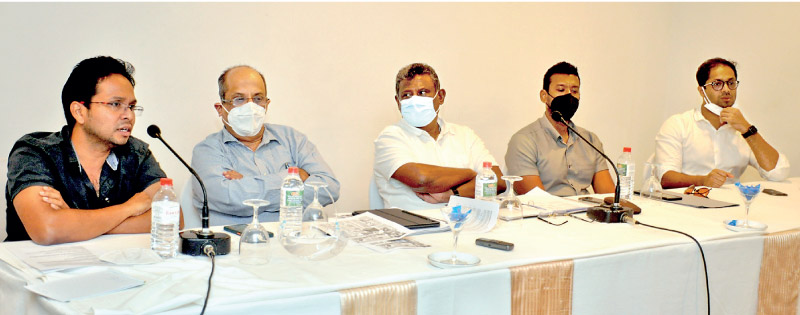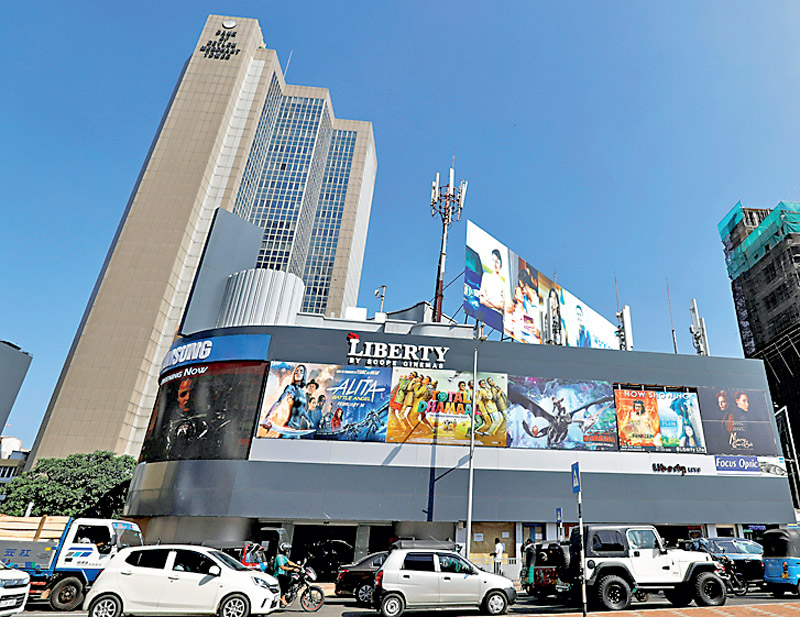Tuesday Feb 24, 2026
Tuesday Feb 24, 2026
Monday, 9 August 2021 03:56 - - {{hitsCtrl.values.hits}}

From Left: LFD Director Thushan Meemanage, Liberty Cinemas Managing Director Imthiaz J. Cader, E.A.P. Films and Theatres G.T. Jeyaseelan, LFD Managing Director Rakith Sugathadasa and Scope Cinemas Chairman Naveed Cader – Pic by Lasantha Kumara
The country’s cinema industry is furious over the National Film Corporation’s (NFC) move to shut out the private sector by going back on the industry’s partial liberalisation and taking up a larger role in distributing films. Cinema owners and private sector importers and distributors warned that the move would be disastrous and put millions of investments made since 2001’s partial deregulation, and those planned for the future, at risk
Worst, they added, that the public would be stripped of choice and a proper cinematic experience to enjoy.
The private sector also warned that the local film industry and artists too stand to lose in the long run.
Having realised the ill-effects of the monopolistic nature of the NFC, including the number of cinemas coming down to 138 from 365 originally, the then Government in 2001 partially liberalised the cinema industry. This saw the emergence of four private circuits, apart from the NFC’s own network Ridma. Each circuit has a collection of cinemas, while NFC’s Ridma has the largest number of around 60.
Post-partial liberalisation, the private sector began investing in cinemas, film imports and distribution, offering the latest movies and a better cinematic experience and choice for the general public. Prior to the setbacks of the ongoing COVID pandemic and the 2019 Easter Sunday terror attacks, the industry was thriving, having increased the number of cinemas to over 200.
With several multiplexes planned, further growth was envisaged. Since liberalisation, the number of movie-going population has grown to over seven million. The industry had drawn up plans to increase the base to 10 million by 2025. NFC as the de-facto regulator too benefitted, gaining 10% per ticket sold.
However, due to misjudgement as well as a need to appease some poor-quality film producers, NFC now wants to roll back the so-far beneficial deregulation and revert to the pre-2001 status quo, angering the private sector.
NFC’s move also comes without any formal consultation with cinema industry stakeholders, including exhibitors (theatre owners), film importers and distributors or the four private circuit operators. The four private sector circuits and importers are Lanka Film Distributors Ltd. (LFD), Cinema Entertainments Ltd. (CEL), EAP Films and Theatres Ltd. (EAP) and Movie Producers and Importers Ltd. (MPIL).
They along with several exhibitors told the media that the Government should further liberalise the film/cinema industry as recommended by the ‘Nilaweera Report’ rather than let NFC, for vested interests, scuttle the process and roll back reforms.
“NFC must become a fully-fledged regulator like the Telecommunications Regulatory Commission of Sri Lanka (TRCSL) or the Public Utilities Commission of Sri Lanka (PUCSL). Instead, NFC is hell-bent on taking over private sector activities as a result of poor judgement and after being misled,” private sector sources said. NFC as a proper regulator can set rules, regulations and standards and liaise if needed between the Government and the private sector, encourage new investments and look after the interests of the public.
“For this NFC need not go back to import or/and distribution. With an extra 10% income via distribution NFC cannot uplift the film industry. Despite its reduced role since 2001, NFC remains inefficient and overstaffed too,” private sector sources alleged.
From a net movie collection, producers/film suppliers get 40%, cinema owners 50% and 10% by distributors/circuits. On the gross income 8% goes as entertainment tax for the Government.
NFC has issued quotas on the import of films on the basis of 13 English films, 14 Tamil films, five Hindi and two of other languages. “This quota is also inadequate if one factors in the existing and upcoming multiplex and multiple showtimes,” the private sector opined.
They also rejected accusations made by NFC that cinemas were ignoring local films and producers.
“Nowhere in the world can an industry ensure every film produced is screened. Obviously, the best get priority in the interests of the industry including the public. If a movie is a flop the loss is on the industry,” they said, adding that one of the best successes in recent years was ‘According to Matthew,’ a local movie featuring Alston Koch and Jacqueline Fernandez.
The private sector circuits also said that collectively they were the biggest financiers of film production at zero cost, and not the NFC, which charges an interest rate on loans given to producers.
The private sector emphasised that further liberalisation with a proper regulatory body would ensure effective development of the cinema and film industry, as well as the public good, in terms of enjoying the best local and foreign films and a world-class cinematic experience.
The cinema industry has also to deal with alternative modes people have such as streaming and TV but expressed confidence that moviegoers will return if the best cinematic experience can be provided. In the 1970s the cinema industry enjoyed a patronage as high as 74 million admissions annually, as people loved watching quality movies even though theatres weren’t as world-class as today, industry sources noted.
